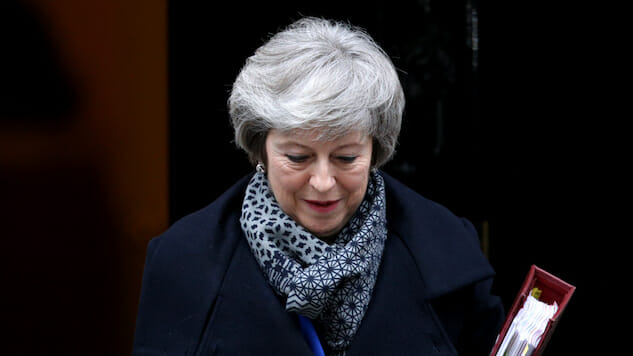What Does Yesterday’s No-Confidence Vote Mean For Brexit?
Photo by Dan Kitwood/Getty
British Prime Minister Theresa May survived a vote of no-confidence on Wednesday after suffering the worst parliamentary defeat in modern history over her Brexit proposal earlier this week.
May remained in control by 325 votes to 306. All 314 Tory MPs supported her government, along with the 10 elected members of Northern Ireland’s Democratic Unionist Party, which has been propping up the Conservative Party in Parliament since 2017.
May already survived one motion of no-confidence in December, and she appears to be on even thinner ice after this latest challenge. Tuesday’s vote saw Parliament strike down her plan for withdrawal from the European Union by a resounding 432 votes to 202. Meanwhile, the March 29 deadline for the U.K.’s exit draws ever closer.
Regardless of who occupies 10 Downing Street, Tuesday’s vote effectively brings Brexit negotiations back to square one, and the legislature appears to have only become more divided. The Remain and Leave camps are no longer identifiable by party line, and those 432 MPs who voted against the plan did so for vastly different reasons. A full 118 of them were from May’s own party. Each faction seems to have dug in on its position rather than moving towards compromise. As May herself said after Tuesday’s results came in, “It is clear that the House does not support this deal. But tonight’s vote tells us nothing about what it does support. Nothing about how or even if it intends to honor the decision the British people took in a referendum Parliament decided to hold.”
Meanwhile, important figures on the other side of the table are losing any hope they had for an effective Brexit. Donald Tusk, the President of the European Council, hinted in a Tuesday night tweet that Brexit should be abandoned altogether. “If a deal is impossible, and no one wants no deal, then who will finally have the courage to say what the only positive solution is?”
-

-

-

-

-

-

-

-

-

-

-

-

-

-

-

-

-

-

-

-

-

-

-

-

-

-

-

-

-

-

-

-

-

-

-

-

-

-

-

-








































